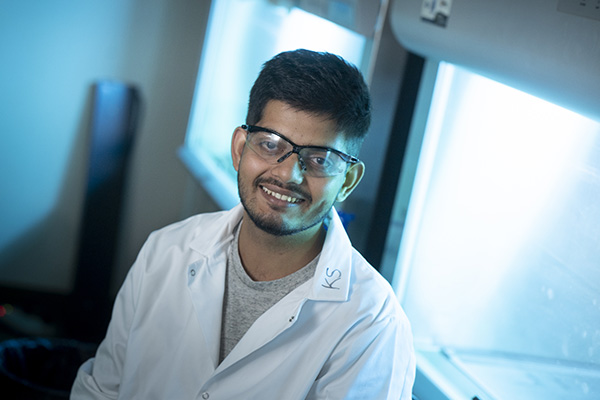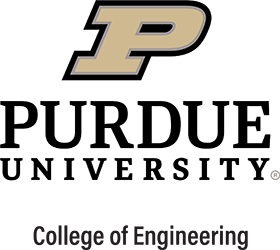Chemical Engineer Grasps Big Picture of Small but Smart Cancer Fight
Chemotherapy is a powerful weapon against head and neck cancers, but it poses numerous challenges for patients, such as the need for frequent infusions and the risk of secondary toxic reactions spreading throughout the body. Kaustabh Sarkar, who has received a Leslie Bottorff Fellowship in his third year of the Chemical Engineering Ph.D. program, is pursuing a potential leap forward in more targeted treatment. It could yield big benefits, thanks to something extremely small, namely nanoparticles.

Sarkar's research encompasses many considerations as he assesses the efficacy of a novel adaptation of standard treatments: new formulations encapsulated in a biocompatible polymer and injected directly into a tumor. This approach is well-suited to oncologists' frequent combination of chemotherapy and radiation. The direct injection would allow patients more time between treatments and prevent the drug from carrying side effects beyond the cancer site.
"This improves the quality of life for the patient," says Sarkar, who works with fellow chemical engineer and mentor You-Yeon Won through the Ph.D. program established by the Purdue College of Engineering. Won leads the laboratory within the Davidson School of Chemical Engineering which is developing the nanoparticle drug-delivery system. It envisions multiple advances. The capsules, once injected, release their content as they degrade during the radiation treatment. Monthly localized injections of these capsules could replace the weekly intravenous infusions of standard chemotherapy.
But there is much "very collaborative research" yet to be done. Efficacy will first be tested with mouse models and, later, with canine models. Questions include: What makeup of nanoparticles and formulations will work best with different treatment protocols? This brings Sarkar into contact with the radiation oncology unit in Purdue's College of Veterinary Medicine, among other centers of expertise and labs. Looking ahead to human applications, he is also working with physicians at Indiana University School of Medicine. Two principal mentors in clinical translation are Dr. Mark Langer, for radiation oncology, and Dr. Greg Durm, for oncology/ hematology. They help this researcher obtain the practical insights necessary to assess the upgrade in treatments and the formulation’s potential for clinical translation.
Sarkar says he has appreciated his preliminary encounters with cancer patients, seeing the manifestations of head and neck tumors and the challenges associated with delivering localized chemoradiotherapy in a clinical setting. He received his undergraduate chemical engineering education from the Institute of Chemical Technology in India. A biomaterials course there intrigued him, but he acknowledges he has faced "a steep learning curve" as a graduate student regarding the ways of biomedical experimentation. The university program's reputation for supporting students' needs and aspirations through interdisciplinary cooperation was "a big motivation for choosing Purdue."
The in-depth experience in health-care experimentation he is gaining—and will continue to gain until his planned graduation in 2021—moves him closer to his career goal. Sarkar anticipates working in the biopharmaceuticals-biomaterials industry, perhaps while operating his own laboratory.
Ongoing travels between Purdue labs in West Lafayette and Indianapolis hospitals, especially the IU Simon Cancer Center, will be valuable in exploring clinical translation prospects. "It helps to see the patient's entire time of care, from diagnosis to treatment to post-treatment," Sarkar says. The fellowship provides an opportunity for up-close observation of clinical chemoradiotherapy and for advancing his current in vivo studies.
Combining his chemical engineering background with biological insights became a personal goal driving the search for graduate schools and his selection of the Purdue partnership. He saw medical initiatives he deemed meaningful in the name of humane patient care. "I had seen my grandfather and others of my family and friends deal with diagnostic tests for cancer," Sarkar says. "That was one reason I was very interested in cancer research when I came." He hopes nanoparticle advances against head and neck tumors will find additional applications with similar diagnoses.
"It's emotional to get into this field," he comments. The most basic goal of his research will be achieved if, in the future, "we don’t think of cancer as a death sentence."


